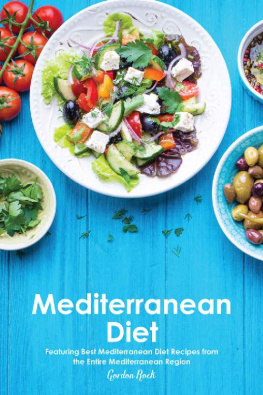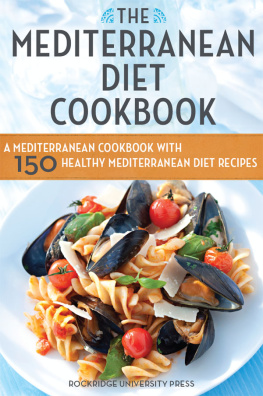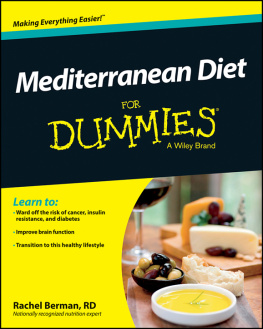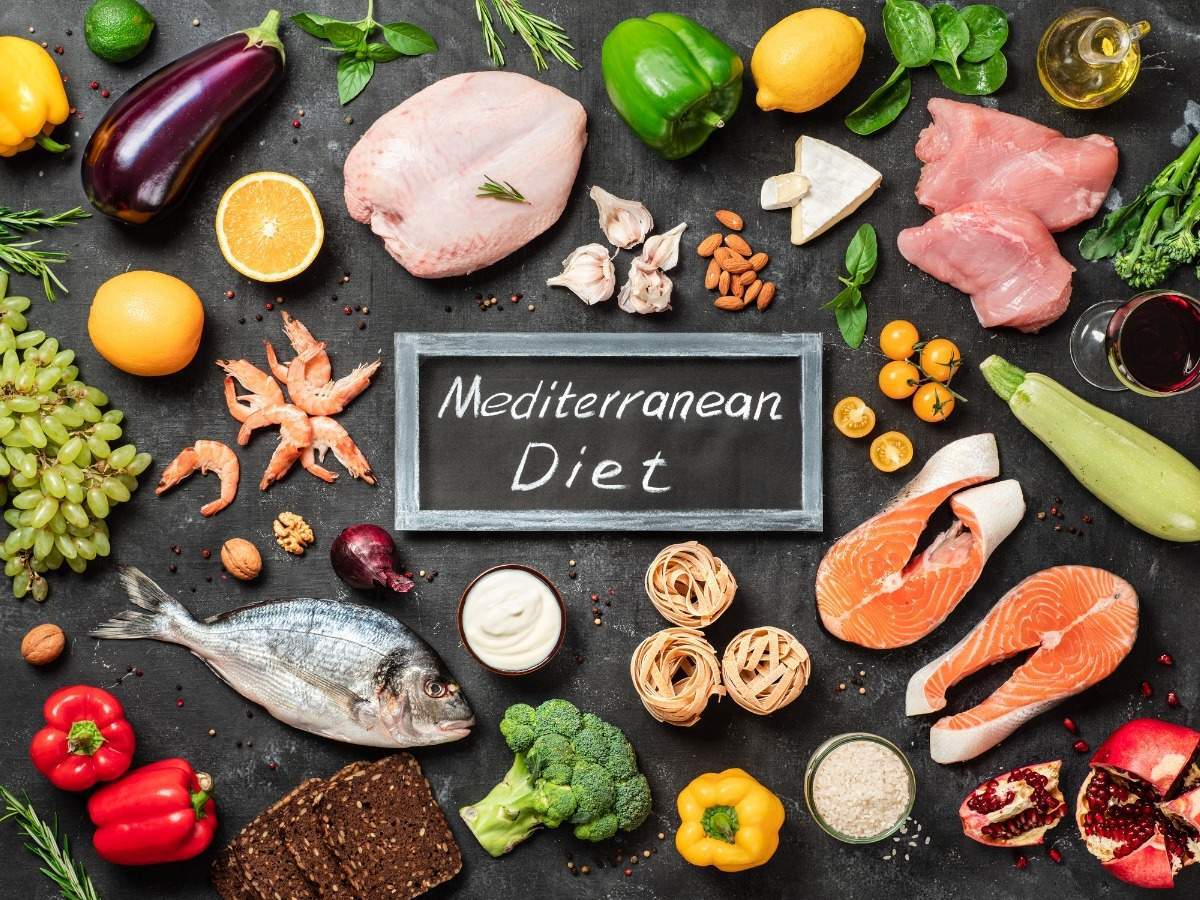MEDITERRANEAN
DIET COOKBOOK
WITH PICTURES
Easy & Delicious Mediterranean Recipes for Beginners and Advanced Users
Marcie Janes
Table of Contents
Introduction
The Mediterranean diet is both delicious and nutritious, thanks to its abundance of savoury components such as fruits, vegetables, whole grains, and heart-healthy fats.
It's also linked to a slew of health benefits, including supporting brain function, promoting heart health, and regulating blood sugar levels, among others.
Although there are no hard and fast rules for following the Mediterranean diet, there are a number of general suggestions you can follow to incorporate the diet's principles into your everyday routine.
This article delves deeper into the Mediterranean diet, including what it is, how to follow it, and how it can benefit your health.
Fundamentals of Mediterranean Diet
What Is Mediterranean Diet?
The Mediterranean diet is based on the traditional cuisine that people in Mediterranean nations like France, Spain, Greece, and Italy used to eat.
Although there are no particular dietary guidelines, fruits, vegetables, whole grains, legumes, nuts, seeds, and heart- healthy fats are often encouraged. Refined cereals, processed meals, and added sugar should all be avoided.
A growing body of evidence suggests that the Mediterranean diet can help people lose weight and prevent heart attacks, strokes, type 2 diabetes, and premature death.
As a result, the Mediterranean diet is frequently suggested to people who want to enhance their health and protect themselves from chronic disease.
Dietary guidelines indicate that persons consume the following foods:
a wide range of fruits, veggies, and whole grains
nuts, seeds, and olive oil are all good sources of healthy fats.
modest dairy and seafood intake
a small amount of white meat and a small amount of red meat, as well as a few eggs
red wine, but only in moderation
Antioxidant-rich fruits, vegetables, whole grains, beans, legumes, nuts, seeds, olive oil, herbs, and spices are all part of a traditional Mediterranean diet. It also encourages regular diet of omega-3-rich fish and seafood, as well as poultry, eggs, cheese, and yoghurt on a weekly basis. Red meat, sweets, and other processed foods are not allowed in the diet. In moderation, red wine is recommended, although it is not required. Coffee and tea are permitted, but make sure to drink enough water.
How Does It Work?
As more studies into the health benefits of this type of diet have been conducted, specific items may be discovered to be more important in the future. For the time being, however, it appears that the overall diet approach and variety of foods, rather than individual "superfoods", are what make this such a healthy way of eating.
This makes sense, because if you're eating an unhealthy diet full of processed foods, adding one factor like olive oil as the sole change you make is unlikely to have a significant impact on your health. However, if you change your entire diet to include a bit less meat and a little more fish, choose healthy fats, and eat more fruits and vegetables, you might be able to lose weight.
The Advantages of The Mediterranean Diet
It promotes heart health.
The Mediterranean diet's capacity to boost heart health has been thoroughly researched. In fact, studies have linked the Mediterranean diet to a reduced risk of heart disease and stroke.
One study compared the Mediterranean diet to a low-fat diet and found that the Mediterranean diet was more successful at slowing plaque build-up in the arteries, which is a key risk factor for heart disease.
According to other studies, the Mediterranean diet can help lower diastolic and systolic blood pressure, which is good for heart health.
It helps to maintain a healthy blood sugar level.
Fruits, vegetables, nuts, seeds, whole grains, and heart-healthy fats are all encouraged in the Mediterranean diet.
As a result, adhering to this eating pattern may aid in the stabilisation of blood sugar levels and the prevention of type 2 diabetes.
Multiple studies have discovered that following a Mediterranean diet can lower fasting blood sugar levels and enhance haemoglobin A1C levels, a test used to assess long-term blood sugar control.
Insulin resistance, a disorder in which the body's capacity to use insulin to efficiently manage blood sugar levels is impaired, has also been linked to the Mediterranean diet.
It helps to keep the brain healthy .
Several studies suggest that the Mediterranean diet is good for your brain and may even prevent you from cognitive loss as you age.
For example, adherence to the Mediterranean diet is linked to improved memory and lower levels of numerous risk factors for Alzheimer's disease in a research including 512 persons.
The Mediterranean diet has also been linked to a lower risk of dementia, cognitive impairment, and Alzheimer's disease in other studies.
Furthermore, one major review found that eating a Mediterranean diet improved cognitive function, memory, attention, and processing speed in healthy older persons.
It can assist in the prevention and management of type 2 diabetes.
It may seem contradictory that a diet high in carbohydrate-rich foods like pasta and ancient grains would aid in the management or prevention of type 2 diabetes. However, there are a couple important aspects that make this reasonable: whole grains and carbs from vegetables, which do not alter blood sugar as much as processed carbs, are emphasised in the Mediterranean diet.
The diet also includes a lot of protein and healthy fats.
Too many sweets and desserts are forbidden on the diet.
Exercise is encouraged as part of the Mediterranean lifestyle, which aids with diabetes treatment. The effect of the Mediterranean diet on diabetes risk was explored in a 2014 analysis of nine separate studies, and the researchers discovered that following a Mediterranean diet can reduce the risk of diabetes by up to 19%.
A study published in 2020 backed up previous findings, stating that higher adherence to the Mediterranean diet is linked to a lower risk of type 2 diabetes.
It can protect you from cancers in some degree.
The Mediterranean diet is well-known for its ability to protect against chronic diseases such as diabetes, heart disease, and metabolic syndrome. As it turns out, this anti-inflammatory and antioxidant-rich diet may also protect against cancer.
Breast cancer, stomach cancer, liver cancer, prostate cancer, and head and neck cancer can all be prevented by following a Mediterranean diet, according to a 2017 assessment of studies.
The preventive benefit is "primarily driven by larger diets of fruits, vegetables, and whole grains," according to the authors.
Another study published in 2015 compared the effects of a Mediterranean diet vs a low-fat diet on breast cancer prevention in women. What were the outcomes?
A Mediterranean diet, particularly one supplemented with extra virgin olive oil, has been shown to help women fight breast cancer.

















